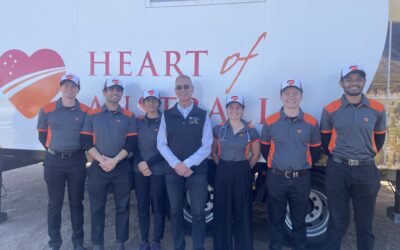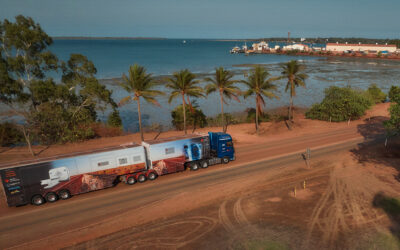
When Heart of Australia launched its latest mobile clinic, HEART 5, the goal was simple, to deliver better health for rural and remote Australia. Thanks to its world-first battery-powered CT scanner from Philips and the support of I-MED Radiology and Resources Safety and Health Queensland, HEART 5 has been doing just that.
Since its launch five months ago, the mobile respiratory clinic has seen over 1000 patients and travelled over 20,000 kilometres.
Heart of Australia’s Head of Operations and Business Development, Ewan Wylie, believes without HEART 5 coming to these rural outposts, current, former and retired mine and quarry workers may not receive the treatment they need.
“When we come out to these rural towns, the people coming forward for testing typically haven’t had routine medical checks, and often struggle just to get into their GP for a basic check-up, let alone access the scans that we can deliver,” he says.
“But, there’s a real camaraderie here with the retired miners, still looking after each other and encouraging each other to come forward in Collinsville. We want to see that spread across all of our other regions”
“HEART 5 means that Australians living in tiny towns of less than a thousand people suddenly have access to the same type of services that we expect in any of our major metropolitan hospitals.”
HEART 5 RETURNS TO COLLINSVILLE

A recent return trip to Collinsville meant the HEART 5 team caught up with its first-ever patient, 84-year-old retired miner, Doug Batchelor.
Batchelor, who spent more than forty years underground mining Collinsville’s coal, believes the work HEART 5 is doing is essential for his mining community.
“I think it’s marvellous, a truck like this has been a long time coming, but I think it’s marvellous,” he says.
“Everyone I’ve spoken to, right through the whole system at Heart of Australia, they’ve been good, they’ve rung me back.
While still fit and active — walking, swimming and maintaining his garden nearly every day — Doug, who retired at 67 years of age knows the effects his years with dust can cause.
“The old fellows used to say it’s not the dust you can see, it’s the dust you can’t see that gets into you,” Batchelor adds. “There are a lot of miners who are getting older like me so I am frightened for some of the fellows who are in the sixties and seventies now because you only have to look at the dust coming out of some of these mines.”
Despite the potential health issues, Batchelor is still passionate about the industry, even taking regular groups through the Coalface Experience in town, detailing tourists through the history of Collinsville’s mining history.
“If I had my life over again, I’d go back again and again,” he adds.
INSIDE HEART 5
Heart of Australia program supporters NTI recently spent a day with us in Biloela filming with HEART 5 to better understand its capabilities and the significance of being able to screen those patients in rural and remote areas of Queensland. You can check it out here:
Now with HEART 5’s busy schedule delivering these important CT radiology services, the five-strong Heart of Australia fleet is helping to pave the road for accessible healthcare across Queensland.
As we continue to bridge the gap in rural healthcare, we look ahead to the future and the many possibilities to help bring this successful model to the national stage.
Former and retired mine and quarry workers can contact mine Dust Health Support Service on 1300 445 715 or info@minedusthealthsupport.com to apply for a free lung check.



